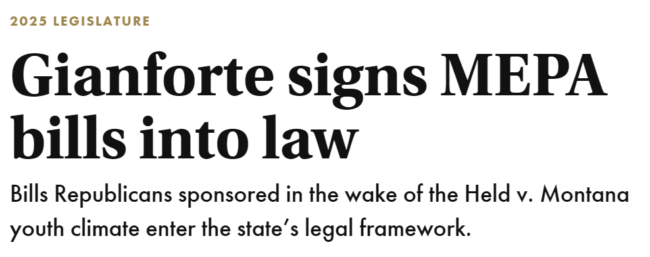by Anne Hedges
When the Montana Supreme Court ruled that Montanans’ fundamental constitutional right to a clean and healthful environment includes the right to a stable climate, we knew the victory could spell trouble. When the Montana Supreme Court issued its decision in the Held v. State of Montana case in December, the legislative session was due to start just two weeks later. In Held, the court ruled that the state must consider climate change and its impacts when conducting an environmental analysis under the Montana Environmental Policy Act (MEPA).
MEPA is a 50-year-old Montana law that allows neighbors to learn the details about proposed developments in their area. This law provides the public with specifics on a project’s location, environmental and social impacts, as well as information about harm to wildlife, cultural, and historic resources – such as sacred Tribal sites or other historic landmarks that could be impacted. MEPA provides everyday Montanans with the details they need to learn more about a project and how it will impact their safety, community, sacred places, or families’ health. And it allows the public to comment on the project and requires the State to respond to those comments.
MEPA has been under attack for 25 years. Time and time again, the same cast of high-paid industry lobbyists line up at the Capitol to complain — the public wants to know too much, they ask too many questions, and they demand answers from agencies that should be catering to their employers. If these lobbyists had gotten their way sooner, we might not have mitigation solutions such as dust suppression on rural roads near industrial operations and prevention of shooting ranges next to school bus stops — and yes, these are actual examples of how MEPA has helped Montanans.
Since 2001, these same corporations have told legislators that MEPA is hampering economic development and interfering with their ability to make money. But they are wrong; there is no history of the State ever denying a project from moving forward under MEPA.
MEPA simply requires a “hard look” at the impacts and an opportunity for the public to be notified and provide input. In fact, in 2011, after signing a bill to weaken MEPA, Gov. Brian Schweitzer ordered agencies to consider how the new law would improve business development. A subsequent comprehensive look at MEPA makes no mention of lost profit or jobs, though it does conclude by saying, “Nearly everyone we spoke with suggested that to the extent that MEPA provides more information to the public and allows the public to contribute, it is a great decision-making tool.” MEPA doesn’t impair economic development; it ensures that it is done in a way that considers the people who already live there.
Two bills rose to the top of MEIC’s priority list during this session as attempts at an end run around the Department of Environmental Quality’s (DEQ) obligation to consider climate change impacts when it issues air pollution permits for projects like power plants or oil and gas wells.
HB 285 (Rep. Brandon Ler, R-Savage) and SB 221 (Sen. Wylie Galt, R-Martinsdale) were greased from the start and flew through the process with no amendments. HB 285 repeals language from MEPA that references our constitutional right to a clean and healthful environment. It also repeals a provision that says MEPA is supposed to prevent harm, repeals language requiring consideration of long-term productivity of the land and consideration of long-term impacts from projects, and eliminates language that asserts MEPA is supposed to protect against the decline of Montana’s environment.
SB 221 tries to narrow the scope of any analysis of a project’s impacts on climate change to such a degree as to make it utterly meaningless. Despite containing bizarre language that could not be interpreted by the sponsor, industry and pro-fossil fuel unions lined up to support SB 221 using the same old tropes they used to weaken MEPA in 2001 and again in 2011 — much of which has been ruled unconstitutional by the Montana Supreme Court. Overall, the bill requires the State to ignore climate impacts even when a project will result in hundreds of millions of tons of greenhouse gas emissions.

Cartoon by John Moore, used with permission.
But they didn’t stop there. Republicans have argued for years that the state cannot deny a permit under MEPA; it can only do so when issuing permits under substantive statutes like the Clean Air Act. In a preemptive move, the Legislature passed HB 291 (Rep. Greg Oblander, R-Shepard). HB 291 prevents the state from adopting any regulation for greenhouse gases that was not adopted first by the federal government. The result is that the state cannot mitigate or limit greenhouse gas emissions.
If the state cannot analyze or limit greenhouse gas emissions from industrial operations, then those who are concerned about the climate crisis have nowhere left to turn but the courts. Fortunately, the courts have consistently protected our right to a clean and healthful environment and the right to participate from such legislative attacks. Unfortunately — and by design — it takes litigation, money, and years of legal wrangling to get the court to weigh in.
These bills are ultimately a stall tactic to prevent action on the climate crisis while powerful lobbyists and politicians rake in the cash from industrial polluters. MEIC, public health advocates, and the people of this state who care about the environment, public health, and the economy will push back against these industrial robber barons. Montanans’ constitutional rights, health, and ability to protect our families and property depend on it.
This article was published in the June 2025 issue of Down To Earth.



